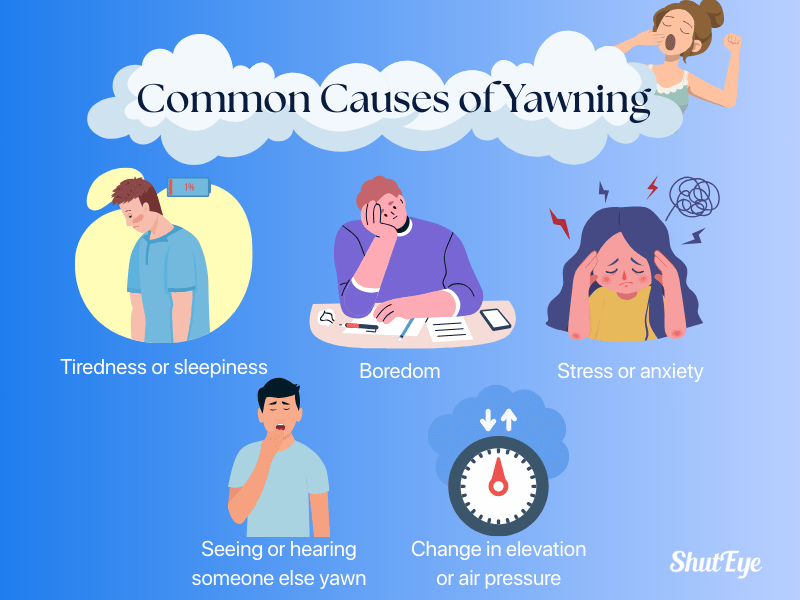


Whenever you start to feel a little tired, do you get this uncontrollable urge to yawn? Yawning is a normal and common process that may happen anytime and any day. But why do we yawn and is it really contagious? Let’s find out the answer to this common question.

Yawning is an involuntary opening of the mouth with your jaws wide. It comes with a deep breath in through your mouth and nose, followed by a long and slow breath out. It is a common human behavior that may happen in response to sleepiness and could be linked to changes in brain temperature [1].
It is said that the average person yawns about 5 to 20 times a day, with each yawn lasting around 5 seconds [2].
Currently, scientists don’t have a clear explanation as to why we may yawn. Some psychological experiments have found that yawning may happen in response to seeing, hearing, or thinking about someone else yawning [3].

One common theory is that yawning helps to cool down our brain and regulate body temperature when it increases. The theory is based on evidence found in studies involving different animal and human models.
In one study that involved birds, it was observed that there were increased instances of yawning at higher ambient temperatures compared to lower temperatures [4].
Another study also concluded that yawning acts as a brain cooling mechanism, helping us to cool down internally [5].
Aside from this, some research suggests that yawning could be a way for us to stretch our muscles and joints, increase the heart rate, and highlight its physiological significance in increasing our alertness and focus [2]. It is also theorized that yawning helps to increase blood flow to the brain.

Some of the common causes or triggers of yawning include:

Yes, yawning can be contagious. Contagious yawning is a reflexive tendency that occurs upon witnessing or hearing someone yawn. It is highly documented in humans as well as animals.
One study has found that there is a higher chance of auditory contagious yawning when you are closely bonded to someone compared to those are weakly bonded [6].
Excessive yawning can be a sign of an underlying issue. It could be a sign of excessive tiredness or sleep deprivation. It may also be a symptom of a sleep disorder, or a side effect of medications.
Sometimes, it may even be a sign of a serious medical issue such as a heart attack, stroke or brain tumor.
If you experience excessive yawning along with other symptoms such as poor sleep patterns or face functional difficulties during the day, you may want to consider seeking advice from a healthcare professional to rule out any serious medical conditions.
If you feel that your yawning frequency may be related to your sleep patterns or lifestyle, then you want to focus on practicing good sleep hygiene and making good lifestyle choices.
Here are some sleep hygiene tips to help you manage your yawning:
Creating a good sleep environment can help make sleep easier to come by and help prevent sleep disruptions. Having a good sleep environment means ensuring that it is dark, quiet, and cool. Dim the lights, set your air conditioner at a comfortable temperature, and consider using a white noise machine to block out external noises if you live in an area that is noisy.
Establishing a consistent sleep schedule by waking up and going to bed at the same time each night, even on the weekend, helps to regulate your body’s circadian rhythm. It sends a signal to your brain when it is time to wake up and when it is time to fall asleep. Thus, it makes it easier for you to fall asleep and wake up in the morning.
Find the best time to fall asleep and wake up with our FREE sleep calculator now!

Another thing you want to ensure is that you are managing your stress properly. Yawning can sometimes happen as a result of stress and anxiety. It’s your body’s way of regulating your breathing and oxygen intake.
Some ways to manage your breathing include doing deep breathing exercises or practicing relaxation techniques such as progressive muscle relaxation or guided meditation.

While exercise may not help to get rid of yawning completely, it can help in improving your overall well-being and reducing your overall stress. Reduced stress leads to better sleep quality, which in turn reduces fatigue-associated yawning.
While there is still a lack of compelling explanations as to why we yawn, the more common theories that many have recognized are that it is a natural response to fatigue and that it aids in brain thermoregulation. To manage excessive yawning, you want to try to incorporate more good sleep hygiene practices into your routine.
Discover more ways to reduce yawning and sleep better with ShutEye® app. ShutEye is an advanced sleep tracking app that analyzes your sleep cycles, offering personalized insights on your sleep habits. Try it today for free!
Gallup, A. C., and Wozny, S. (2022) Interspecific Contagious Yawning in Humans. Animals : An Open Access Journal From MDPI, 12(15), 1908 [online]. Available at: https://doi.org/10.3390/ani12151908
Gallup, A. C., Miller, M. L., and Clark, A. B. (2008) Yawning and thermoregulation in budgerigars, Melopsittacus undulatus. Animal Behaviour, 77(1), 109-113 [online]. Available at: https://doi.org/10.1016/j.anbehav.2008.09.014
Gallup, A. C. (2006) Yawning as a Brain Cooling Mechanism: Nasal Breathing and Forehead Cooling Diminish the Incidence of Contagious Yawning. Evolutionary Psychology [online]. Available at: https://doi.org/10.1177/147470490700500109
Gupta, S., and Mittal, S. (2013) Yawning and its physiological significance. International Journal of Applied and Basic Medical Research, 3(1), 11 [online]. Available at: https://doi.org/10.4103/2229-516X.112230
Norscia, I., Zanoli, A., Gamba, M., and Palagi, E. (2020) Auditory Contagious Yawning Is Highest Between Friends and Family Members: Support to the Emotional Bias Hypothesis. Frontiers in Psychology, 11, 503511 [online]. Available at: https://doi.org/10.3389/fpsyg.2020.00442
Solan, M. (2022) You don't say? The yarn on yawning [online]. Available at: https://www.health.harvard.edu/staying-healthy/you-dont-say-the-yarn-on-yawning